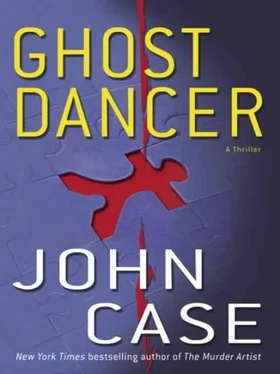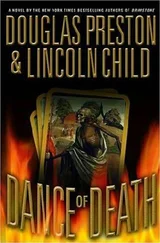“You do?”
“Culpeper, yes? You want to know is our boy?”
“I wondered…”
“Is him. These facility – aircraft, too! – protected against ordinary EMP. But not scalar EMP. You can’t stop it.”
“But I thought if Wilson used the weapon it would be… Tunguska.”
“It’s different way. You think this town is back in business soon? No no. Years. ”
“So he struck out at the banks. You think that’s it?”
“No,” Ceplak said. “I think, now he knows it works, he will go again. Bigger.”
KUALA LUMPUR | JUNE 9, 2005
Andrea Cabot worked her way through her morning yoga routine. Her instructor discouraged listening to the news, and in fact recommended “soothing music,” but Cabot was too busy not to multitask. CNN was on in the background.
She had to agree that the broadcast was not conducive to concentration. It was hyperactive, scattershot coverage of the Culpeper incident: the plane, the inoperable cars, the power outage, the “down” banking centers, the fires.
As Cabot executed the transition between Downward Dog and the Baby pose, the breathless reporter gave way to the first in a parade of experts.
“Remember that old movie? The Day the Earth Stood Still ? A man arrives from outer space, and as a display of power, he causes every motor and engine in the world to stop for half an hour. That’s what happened to Culpeper. The world just… stopped. ”
Andrea Cabot tuned out. She already knew more about Culpeper than she wanted to, thanks to an avalanche of flash cables that started to arrive within minutes of the event and had not yet diminished. She knew more than the expert or the reporter or the crazed eyewitnesses or the spokespersons for NOAA, FBI, and FEMA.
She knew that Culpeper had been deliberately attacked, that the array of disasters was not the result of a “solar storm” or “geomagnetic anomaly” or “coronal mass ejection.”
It was the result of an electromagnetic pulse of precise dimension and unusual power, probably from an E-bomb, but an E-bomb of “an unprecedented level of sophistication and precision.” What really stunned the analysts were two facts. The first was the power of the pulse. The banking facilities in Culpeper had been hardened against conventional EMPs, as was true of most sensitive facilities. This EMP had overwhelmed state-of-the-art shielding. The second thing the analysts couldn’t get past was the “surgical” nature of the attack. That was alarming. That meant the attack involved technology that the Pentagon itself did not possess.
In some ways, though, the assessment had set her mind at ease. It meant that Culpeper had nothing to do with her – and a good thing, too, because she already had a lot on her plate.
She came out of Baby and lifted into Cobra.
Two weeks ago, she’d picked up chatter about an upcoming chain of attacks against “Western” hotels in Bangkok and Kuala Lumpur. Something spectacular and coordinated in the Qaeda style.
But the boys over here would not be employing anything like the Culpeper device – whatever it was. They’d attack with fertilizer bombs. Or with improvised explosive rigs strapped to the chests of young men with Down’s syndrome.
Which was another way of saying that Culpeper was somebody else’s problem.
WAVERLY, NEBRASKA | JUNE 9, 2005
Wilson took a long shower, shaved carefully, then dressed with the care that people reserved for important occasions. It was part of the process of readying himself, a way to bring focus and gravity to what he was about to do.
His clothes were an exercise in misdirection: a cheap pair of athletic shoes and a dark blue jumpsuit with an oval patch containing the name “Jim.” He had a clipboard as well, and a plastic pocket protector with a couple of ballpoint pens. The K-Bar knife from the army-navy store fit comfortably into the large pocket of his jumpsuit. Unlike the rest of his outfit, the knife had nothing to do with misdirection.
He smiled at the workman in the mirror.
Then he put on his watch – not the Garmin, but the watch they’d returned to him the day he’d left Allenwood. It had been taken from him in San Francisco nearly a decade earlier. The feds had put it in a box, and the box had followed him on his long journey through the prison system.
And while he was doing his time, and the watch was running down in the company of his “personal effects,” what had Robbie Maddox – the sleazeball who’d set him up – been doing? While Wilson had nothing to look at but a slice of sky, where had Maddox been and what had he seen? How many meals had he eaten with friends, while Wilson had his food shoved at him through a wicket in his cell door? How many women had Maddox known while Wilson sat by himself, talking to the wall? How much music had Maddox listened to while Wilson tried, and failed, to shut his ears to the constant slam of sliding cell-block doors and the incessant patter and shouts and cries of men without hope?
These were rhetorical questions with a single answer, and Wilson knew what it was. Most of the time, Robbie had been in the joint himself. Two years here and there, a year somewhere else. It was all in the report he’d commissioned from a P.I. named Charley Fremaux, in Chicago.
It took Fremaux less than a week to find the snitch. He was living in Waverly, Nebraska, a suburb of Lincoln, where he had been for more than a year. Injured in a car crash that the police thought was part of an insurance scam gone bad, Maddox had moved in with his older sister, Lynn, a librarian who lived alone. Long since recovered from his injuries, Maddox continued to enjoy his sister’s room and board.
Wilson studied himself in the mirror. He knew that what he was about to do was self-indulgent. It wasn’t part of his larger plan. If anything, it put the plan at risk.
But Robbie Maddox had buried him alive. He’d lied and cheated, bartering Wilson’s life for a few weeks on the outside. There was no way for Maddox to repay the time he’d stolen.
Wilson worked to quiet his mind. He held the image of a leaf in his mind’s eye: a green leaf, caught in a spider’s thread, the leaf spinning and fluttering in the invisible wind.
And then he headed for the door. For Robbie Maddox, time had run out.
Broad daylight. Not just any daylight, but broad daylight, the kind of daylight in which banks get robbed and people get gunned down.
The phrase interested Wilson. Included in the account of a crime, it always carried a note of outrage. It suggested a state of illumination so thoroughly bright and all-encompassing that wrongdoing should be inconceivable. A light that cast no shadows and left no place to hide. Any crime committed under its auspices was all the more horrific.
At one o’clock in the afternoon, Wilson stopped at a pay phone outside a convenience store to call the library where Maddox’s sister worked. He asked to speak with her, and when she came on the line, he hung up.
At one fifteen, he parked the Ford Escort he’d rented around the corner from the little rancher at the address Fremaux had given him. Clipboard in hand, he walked to the front door. A motorcycle sat in the driveway, which suggested to Wilson that he was in the right place at the right time.
He knocked.
When the door swung open, Maddox had about half a second to get away. But it took him a full second to recognize the man in front of him. By then, it was too late. Wilson threw an overhand right that shattered the bones around Maddox’s left eye, and sent him reeling into the living room. Wilson followed him into the house as Maddox, stooped in pain, screamed, “What the fuck?!”
Читать дальше












